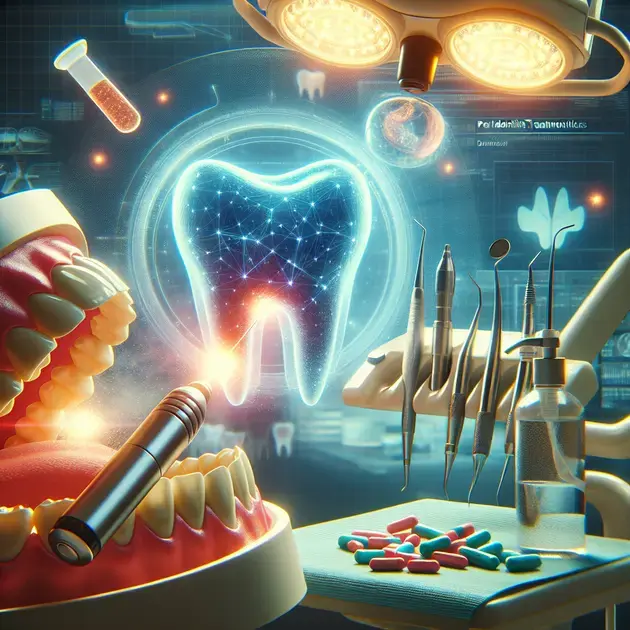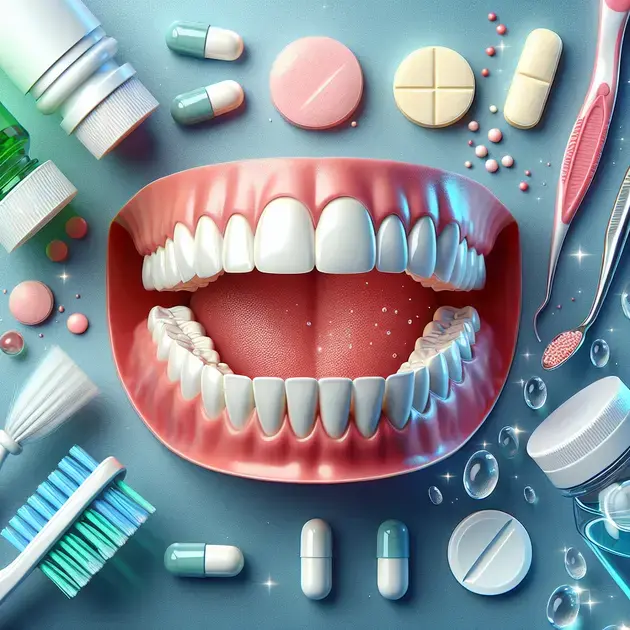When it comes to treating periodontitis, it’s crucial to explore effective medication options that can help manage this condition. Periodontitis, also known as gum disease, is a serious infection that damages the soft tissue and destroys the bone that supports your teeth. Without proper treatment, it can lead to tooth loss and other severe complications.
Fortunately, there are several medication options available that have shown promising results in treating periodontitis. From antimicrobial mouth rinses to antibiotic therapy, these medications can work alongside professional dental cleanings to combat the bacteria causing the infection and help restore gum health. Let’s take a closer look at some of the effective medication options for periodontitis treatment.

Exploring Effective Medication Options
Antimicrobial Mouth Rinses: A Powerful Tool
Antimicrobial mouth rinses are an effective way to maintain good oral hygiene and prevent infections. These rinses contain active ingredients that target and kill bacteria in the mouth, reducing the risk of various oral health issues. One popular brand known for its effective antimicrobial mouth rinses is Listerine. To use an antimicrobial mouth rinse effectively, follow these steps:
- Choose a reputable antimicrobial mouth rinse, such as Listerine.
- Pour the recommended amount of mouth rinse into a cup.
- Rinse vigorously in your mouth for at least 30 seconds.
- Spit out the mouth rinse after rinsing.
- Avoid eating or drinking for at least 30 minutes after use.
By incorporating antimicrobial mouth rinses into your daily oral hygiene routine, you can improve the health of your gums and reduce plaque and bacteria in your mouth. Consistent and proper use of these rinses can help enhance your overall oral health.
Antibiotic Therapy: Enhancing Treatment Effectiveness
Antibiotic therapy plays a crucial role in enhancing the effectiveness of treatment for various infections. When prescribed antibiotics by a healthcare professional, it is essential to follow the treatment plan carefully to ensure optimal results. To maximize the effectiveness of antibiotic therapy, consider the following guidelines:
- Take the prescribed antibiotics exactly as directed by your healthcare provider.
- Complete the full course of antibiotics, even if you start feeling better before finishing.
- Avoid skipping doses and ensure you take them at the same time every day.
- Refrain from sharing antibiotics with others or using leftover antibiotics from previous treatments.
- Consult your healthcare provider if you experience any side effects or have concerns about the prescribed antibiotics.
By adhering to the antibiotic therapy plan outlined by your healthcare provider, you can help combat infections effectively and reduce the risk of antibiotic resistance. Proper use of antibiotics is crucial in ensuring successful treatment outcomes and maintaining overall health.

Antimicrobial Mouth Rinses: A Powerful Tool
Antimicrobial mouth rinses play a crucial role in the effective treatment of periodontitis. These specialized rinses are formulated to target and eliminate harmful bacteria that contribute to gum disease. By incorporating antimicrobial mouth rinses into your daily oral hygiene routine, you can significantly reduce the bacterial load in your mouth, leading to improved gum health.
One key benefit of antimicrobial mouth rinses is their ability to reach areas of the mouth that may be difficult to clean with traditional brushing and flossing. This is particularly important in the treatment of periodontitis, where bacteria can accumulate below the gum line and contribute to the progression of the disease. Antimicrobial rinses can penetrate these hard-to-reach areas and help control bacterial growth.
Furthermore, antimicrobial mouth rinses can provide long-lasting effects, offering protection against bacteria for extended periods after each use. This sustained antimicrobial action is especially beneficial for individuals with periodontitis, as it helps maintain a healthy oral environment and supports the healing process of damaged gum tissue.
When selecting an antimicrobial mouth rinse for periodontitis treatment, it is essential to choose a product that has been clinically proven to be effective. Look for rinses that contain active ingredients such as chlorhexidine or essential oils like tea tree oil, as these have demonstrated antimicrobial properties that can combat the bacteria associated with gum disease.
In conclusion, antimicrobial mouth rinses represent a powerful tool in the comprehensive treatment of periodontitis. By integrating these specialized rinses into your daily oral care routine, you can enhance the effectiveness of your gum disease treatment and promote long-term oral health.
Antibiotic Therapy: Enhancing Treatment Effectiveness
Antibiotic therapy is a valuable adjunct to traditional periodontal treatment methods, offering additional support in combating the bacterial infections that underlie periodontitis. When used in combination with mechanical debridement and good oral hygiene practices, antibiotics can enhance the effectiveness of periodontal treatment and promote more successful outcomes for patients.
One of the primary advantages of antibiotic therapy is its ability to target specific strains of bacteria that may be resistant to conventional treatment methods. This targeted approach allows antibiotics to selectively eliminate harmful bacteria, reducing inflammation and supporting the healing process of damaged gum tissue.
Another benefit of antibiotic therapy in periodontitis treatment is its ability to reach deep pockets within the gums where bacteria may be harbored. By administering antibiotics directly to these sites, healthcare providers can effectively eradicate bacteria and prevent reinfection, helping to stabilize the patient’s oral health and prevent disease progression.
It is important to note that antibiotic therapy should always be prescribed by a qualified healthcare provider and used in conjunction with professional periodontal care. The choice of antibiotic, dosage, and duration of treatment will vary depending on the individual patient’s needs and the severity of their condition. Strict adherence to the prescribed regimen is essential to ensure optimal results and minimize the risk of antibiotic resistance.
In conclusion, antibiotic therapy represents a valuable tool in the comprehensive treatment of periodontitis, offering targeted support in combating bacterial infections and promoting the healing of gum tissue. When used judiciously and in combination with other treatment modalities, antibiotics can enhance the effectiveness of periodontal therapy and help patients achieve improved oral health outcomes.
Comprehensive Medication Plan for Periodontitis: Personalized Approach
A comprehensive medication plan tailored to the individual needs of patients with periodontitis is essential for optimizing treatment outcomes and promoting long-term oral health. By taking a personalized approach to medication management, healthcare providers can address the specific bacterial profile and risk factors of each patient, customizing their treatment plan to achieve the best results.
One key aspect of a personalized medication plan for periodontitis is the selection of antibiotics based on the individual patient’s microbiological profile. By conducting microbiological testing, healthcare providers can identify the specific bacteria present in the patient’s oral cavity and determine the most appropriate antibiotics to target these pathogens effectively. This targeted approach helps optimize the therapeutic effects of antibiotics and minimize the risk of resistance.
In addition to antibiotics, other medications such as antimicrobial mouth rinses, anti-inflammatory agents, and growth factors may be incorporated into a comprehensive medication plan for periodontitis. These medications work synergistically to control bacterial growth, reduce inflammation, promote tissue regeneration, and support overall gum health, providing a multifaceted approach to treating the disease.
Furthermore, a personalized medication plan takes into account the patient’s medical history, allergies, and potential drug interactions to ensure the safe and effective use of medications. By closely monitoring the patient’s response to treatment and adjusting the medication regimen as needed, healthcare providers can tailor the plan to meet the evolving needs of the individual patient and optimize treatment outcomes.
In conclusion, a personalized medication plan for periodontitis represents a holistic and patient-centered approach to treatment, addressing the unique characteristics and needs of each individual to achieve optimal oral health outcomes. By customizing medication therapy based on microbiological data, clinical evaluation, and patient preferences, healthcare providers can enhance the effectiveness of periodontal treatment and support long-term gum health.
Conclusion
Antimicrobial mouth rinses and antibiotic therapy are powerful tools in the comprehensive treatment of periodontitis. By incorporating antimicrobial rinses into your daily oral hygiene routine, you can significantly reduce harmful bacteria, leading to improved gum health. These specialized rinses are formulated to reach areas that traditional methods may miss, effectively controlling bacterial growth below the gum line.
Antibiotic therapy enhances treatment effectiveness by targeting specific resistant bacteria, reducing inflammation, and promoting healing. Administered directly to deep pockets within the gums, antibiotics eradicate bacteria, stabilize oral health, and prevent reinfection. When used judiciously in conjunction with professional care, antibiotics can enhance the outcome of periodontal therapy.
A personalized medication plan for periodontitis is vital for optimizing treatment outcomes. By tailoring the plan to individual needs, healthcare providers can address specific bacterial profiles and risk factors. The selection of antibiotics based on microbiological testing helps target pathogens effectively and minimize resistance. Incorporating various medications like mouth rinses and anti-inflammatory agents provides a multifaceted approach to controlling bacterial growth and promoting gum health.



